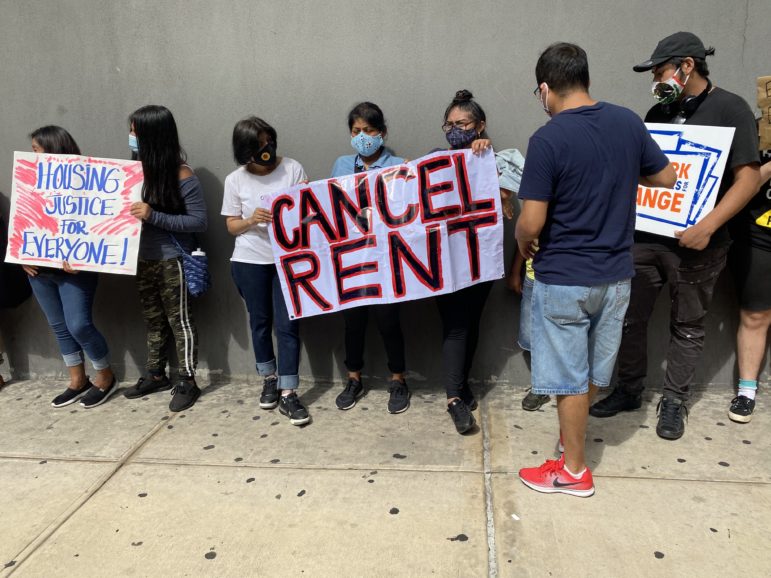The COVID-19 Emergency Eviction and Foreclosure Prevention Act would create a hardship declaration form that tenants can fill out and submit to their landlords, or to housing court, if they’ve experienced economic difficulties due to the pandemic.

Sadef Kully
The scene from a June protest by Housing Justice for All.The state legislature is expected to pass emergency legislation Monday that would halt residential evictions and foreclosures through May 1 for tenants, and some small landlords, who’ve been financially impacted by the pandemic.
The bill comes after months of pressure from housing advocacy groups, who’ve been calling for better tenant protections before the current state and national eviction moratoriums expire on Dec. 31. The COVID-19 Emergency Eviction and Foreclosure Prevention Act would create a hardship declaration form that tenants can fill out and submit to their landlords, or to housing court, if they’ve experienced economic difficulties due to the pandemic — such as lost income, increased health or child care expenses, inability to find work or safely move — which would protect them from evictions through May 1. The bill would also allow property owners with less than 10 units to submit a hardship form, which would protect them against foreclosure and tax lien sales for the same time period, lawmakers said.
Eviction proceedings that are already underway, or those started within 30 days of the legislation’s passage, would be halted for 60 days to give tenants time to fill out and submit the declaration form and for the courts to come into compliance with the new law.
“It’s one of the strongest eviction moratoriums in the country. It’s going to protect millions of people from losing their homes in the middle of a pandemic,” said Cea Weaver, Housing Justice for All campaign coordinator, in an interview with City Limits on Sunday.
Weaver said the bill — which will need to be signed by the governor before taking effect — is a happy compromise that offers much of the same protections advocates have been calling for throughout the pandemic, following months of protest and rent strikes across the state. A September report estimated that New York could see between 800,000 to 1.23 million households unable to pay rent and at risk for eviction, as well as 730,000 eviction filings and between $2.5 to $3.4 billion in rent debt, by the start of the next presidential administration.
“This bill takes greater pains to recognize that it is financial hardship and a public health risk for tenants and homeowners that is driving our concern. So it sets up a process where a homeowner or a tenant can declare themselves to have such a hardship. And at that point they are fully protected,” said Senator Brian Kavanagh, who heads the Senate’s Committee on Housing, Construction and Community Development, during an interview with City Limits on Sunday.
Kavanagh said the hardship declaration is similar to one required under the federal eviction moratorium issued by the Centers for Disease Control, though the state does not require tenants to say they have exhausted all benefits before signing the form, as the CDC’s does.
In addition, small property owners who fill out the declaration form — eligible for those with single home residences, co-ops, or owner-occupied multifamily primary residences with less than 10 units — would be protected under the legislation from credit discrimination. The bill would also automatically renew eligible applicants for property tax reductions under the Senior Citizens’ Homeowner Extension (SCHE) and Disabled Homeowner Exemption (DHE) programs, applications which typically need to be re-certified each year and sometimes require an in-person visit at the assessor’s office.
Kavanagh says the bill will give the state the time to assess the support coming from the federal government while a vaccine is being distributed. The federal COVID-19 relief package, signed Sunday by President Donald Trump, could provide over $1.3 billion dollars in rent relief to New York, and there is more promise for cooperation from the incoming Biden administration as the state looks to begin its economic recovery.









